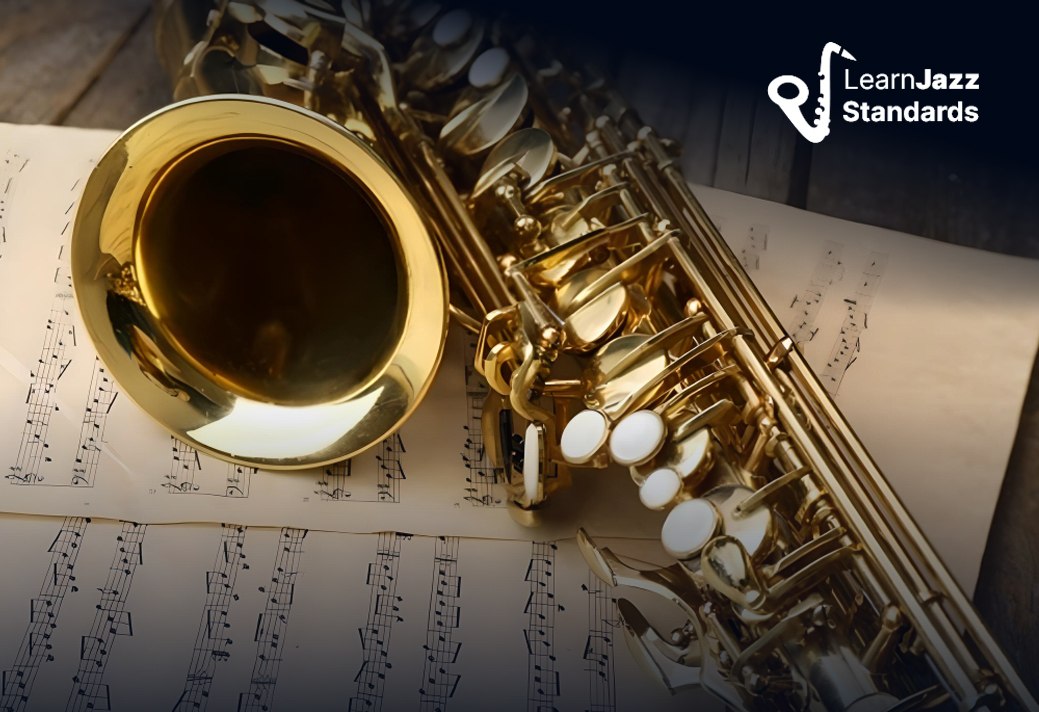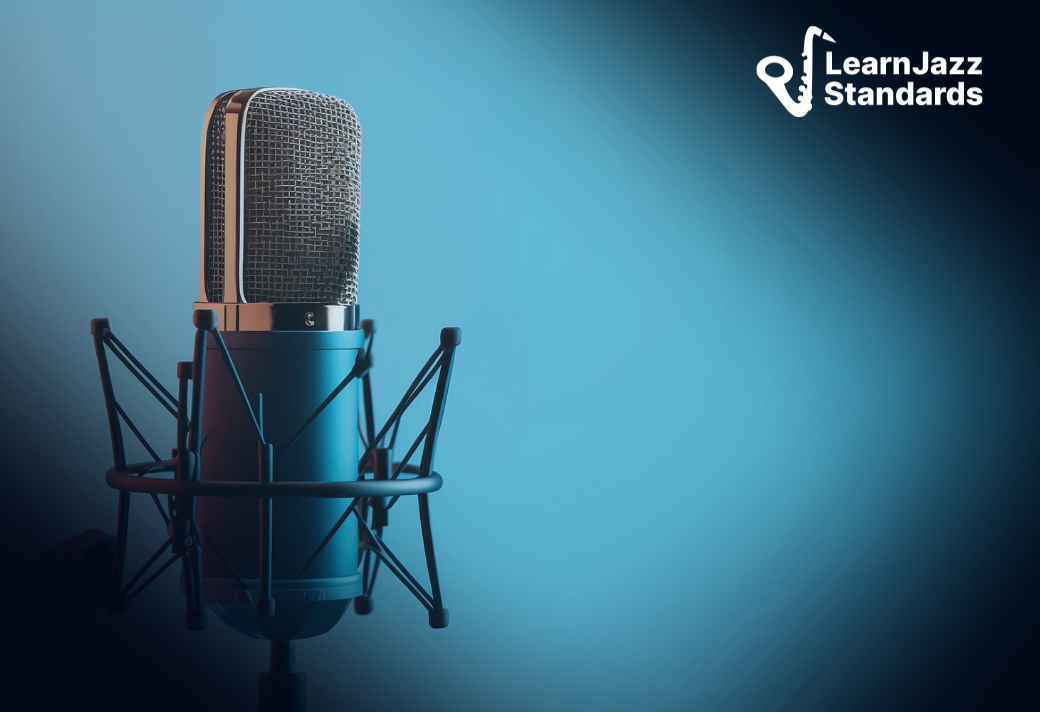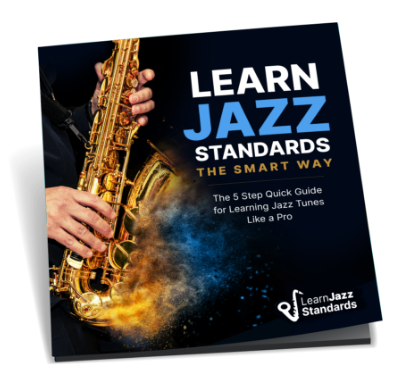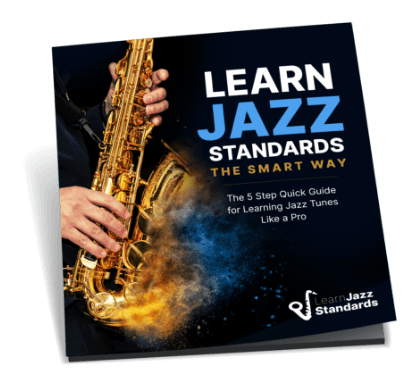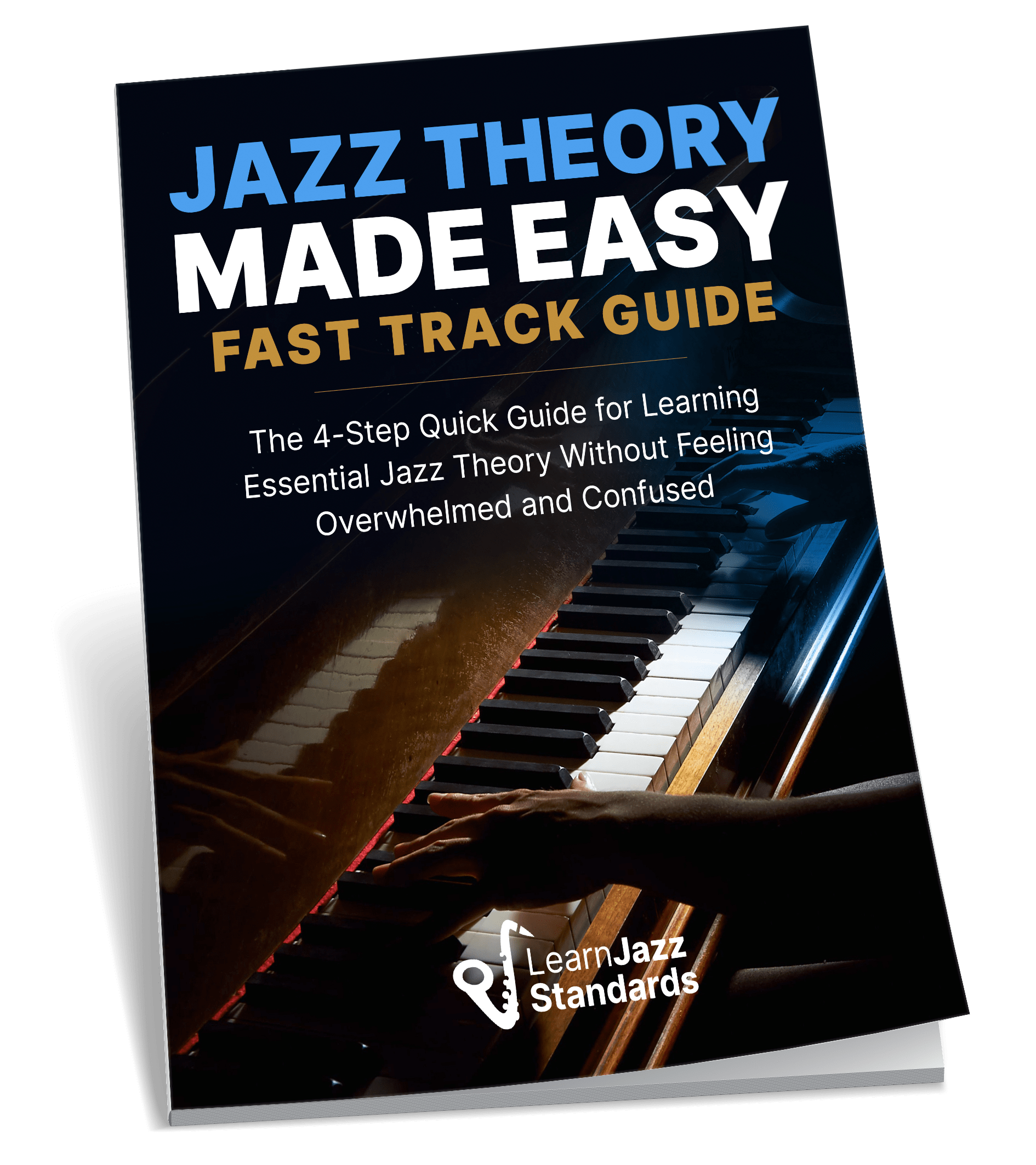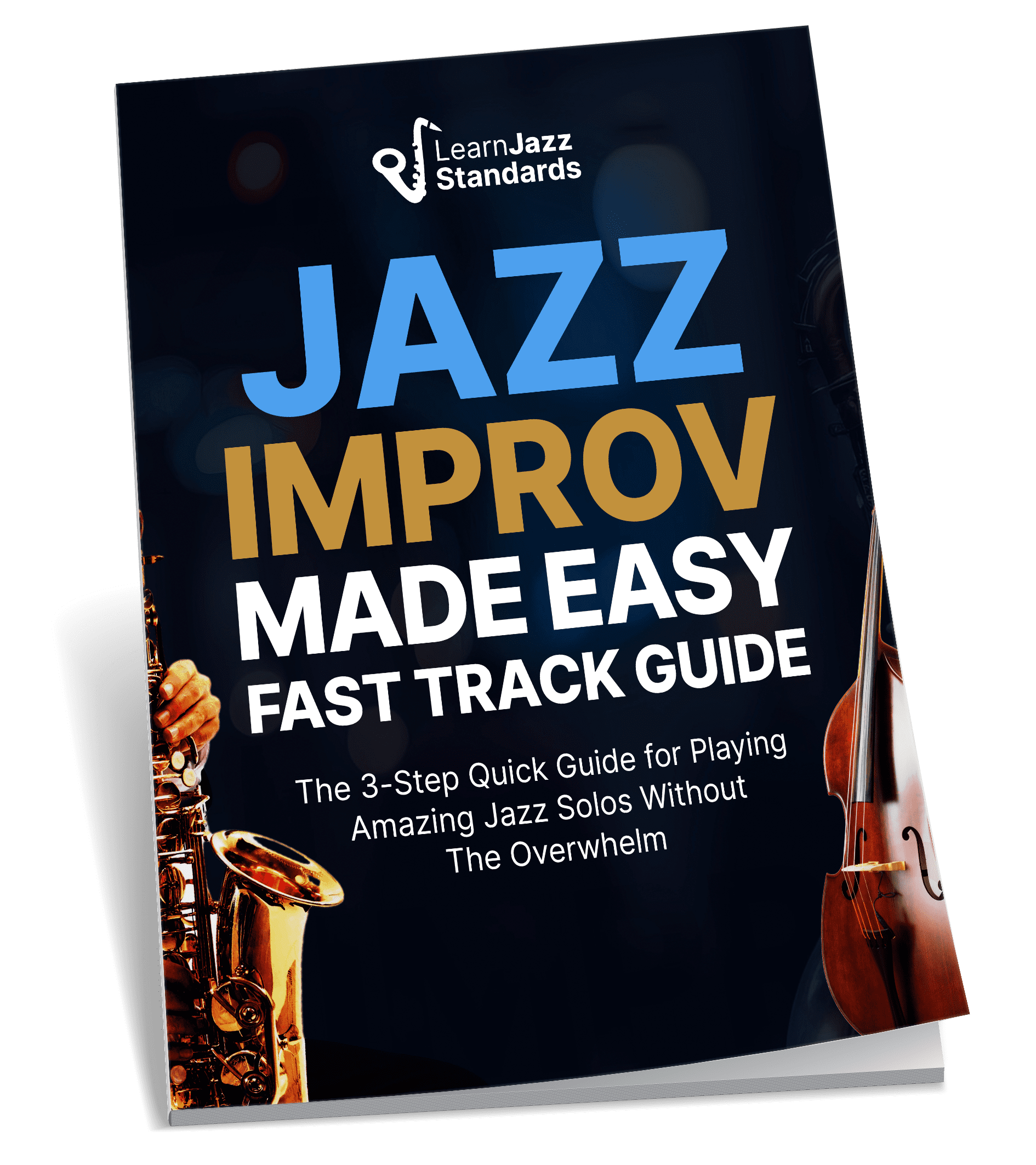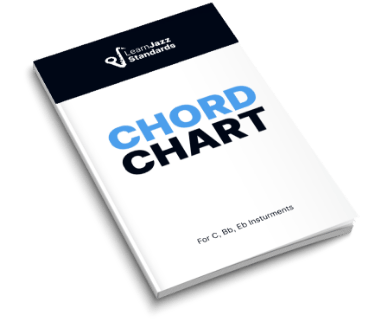Welcome to episode 97 of the LJS Podcast where today we are talking about how we can use the 80/20 Rule to get big results out of 30 minute practice sessions. Life can be busy and sometimes it’s tough to find time to practice. But if we are practicing the right things and stay focused, 30 minutes may be all we need. Listen in!
Listen to episode 97
If you are anything like me, you have a hard time finding time to practice. Even though I am a career musician, often times my work doesn’t allow time to practice; to actually improve upon my skills. So if you aren’t in the line of work that I am, I know that it’s probably even more of a challenge for you.
If you are a listener of this podcast or you follow the lessons on our blog, it’s likely you are excited and motivated to become a better jazz musician. And the only way to improve is to spend some time practicing.
But for many of us, the demands of our everyday life leave little time to hit the shed. Even if we have 30 or 45 minutes to practice, it can feel as if we can’t possibly achieve results within such little time.
Today’s episode is all about debunking the idea that we can’t produce results for our musicianship in a 30 minute practice session. I believe that we can make huge strides if we are practicing the things that actually make a difference in a focused manner.
To do this, we can use the 80/20 Rule to our advantage. The 80/20 Rule states:
“80% of our results come from 20% of our efforts.”
This means that 20% of what we spend time practicing is likely creating 80% of our musical improvements. That doesn’t mean we should ignore the other things we practice, but we should be spending more time working on the 20% that is really moving the needle.
Here’s an outline of what I talk about today:
1. Why I think 30 minutes is enough to improve
2. What’s the 80/20 Rule?
3. Identifying what your 20% is
4. How to structure a 30 minute practice session using the 80/20 Rule
At the end of this episode I give you a challenge. I want you to mark off 3 spots in your schedule where you have an extra 30 minutes. Use these times to practice, apply the 80/20 rule and in the comments below, tell me and the rest of our jazz community how it went!
Important Links
LJS 85: How to Practice Smart and Improve Quickly (Feat. Steve Nixon)
30 Days to Better Jazz Playing eCourse[vc_separator]
Free Guide to learn standards by ear: Learn Jazz Standards the Smart Way
Read the Transcript
Alright, hey what’s up? My name is Brent. I am the jazz musician behind the website, learnjazzstandards.com, which is a blog and a podcast all geared towards helping you become a better jazz musician. Welcome back if you are a regular listener. If you are listening for the first time, I’m really excited you’re here. Thanks so much for hanging with me. I know you’re going to get a lot of today’s episode.
In today’s episode 97 I’m really excited to jump into talking about using the 80-20 rule for productive 30 minute practice. Now, we spent a lot of time on this show talking about setting goals for our jazz playing and practicing in general. What to practice, how to practice, how to find the time to practice. Because at the end of the day, if we want to become better jazz musicians, that’s the only way we can do it, is practice, or getting out there and actually playing gigs, like we talked about in the last episode, 96. It is the new year and so this month it hasn’t been an official theme of the month, but we are talking a lot about goals an actually accomplishing things.
Today, I want to recognize that a lot of us just don’t have a lot of time on our hands. I am right there with you, I always don’t have time to practice, or I have very limited time. So today’s all about trying to figure out how we can get the most out of a 30 minute practice session. That’s right, just 30 minutes and we can get huge results out of that session. Part of the way we’re going to do that is by applying the 80-20 rule. I’ll talk about that a little bit, we get into this show. But I’m really excited first of all to talk about something that I’m really excited about. That is, what’s coming in February, that’s next month.
What we are doing is we ar are celebrating our two year podcast birthday month. To do that we’re starting with episode 100. We’re almost at episode 100, that starts in February. At the end of February is episode 104, which is our two year birthday. To celebrate this I wanted to do something really special for the month. Me and the team decided, got together and said, “You know, let’s do something special.” What I want to do is, if you’ve been listening to the show for a while you know that we have guests on the show from time to time, actually as often as I possibly can because I love hearing from guests, getting their perspective, teaching you guys. I don’t have all the answers of course, so I want to get other people to share with you guys and give you guys value. But I know a lot of you listening today, you’ve been listening for a while, you have something to offer to this audience. Whether you’re a beginner at paying jazz, whether you’re intermediate, whether you’re more of an advanced player. You have something to offer to all of us.
You know, this isn’t just my podcast, this is not Learn Jazz Standards’ podcast, this is your podcast too. So here’s what I want you to do, I want you to go to learnjazzstandards.com/record, and I want you to record a two to six minute little bit for us, sharing what you know with us, sharing your information with us. It’s really simple, you just go to learnjazzstandards.com/record and there’s a little record button there. You can record straight from your computer microphone, and then I have a list of questions that I’m going to ask you. Some of them include just telling us where you’re from, what instrument you play, how long you’ve been listening to the podcast. You know, just to get to know you. And then, what are you practicing right now that could inspire other people? And then share a top piece of jazz advice or a story success that you have, that you think will help everybody else listening to the show. And the of course, what’s your number one goal for your jazz playing this year? What do you hope to accomplish and improve on?
I think that by sharing our stories with each other we can inspire each other, maybe we can help each other learn by just listening to each other, those who actually listen to the show. If you want to participate, if you want to be on the show as a guest, go to learnjazzstandards.com/record and record there. Now, just a little warning, we may not be able to feature everybody’s stories, everybody’s advice on the show during that month, because there’s going to be a lot of people that submit recordings. So don’t be offended if yours is not included, but please do submit a recording. There’s a good chance that it could be featured. Okay, now let’s jump in today’s show. I’m excited to talk about using the 80-20 rule for productive 30 minute practice.
Alright, so tell me if you can relate with this here. You have a job, you have a family, you have relationships, you have extracurricular activities, you have to cook, you have to do chores around the house, you have to take care of things, AKA you have responsibilities. The thing is you also love jazz and that’s why you’re listening to this podcast. You are my target audience here. You want to become a better jazz musician because you truly enjoy playing music, you truly enjoy jazz music, just like I do. But the problem is you have so many responsibilities, you have so much stuff going on, that you just don’t feel like you have the time to practice.
Now if that’s you, I can relate with you completely. Even though my job, I am a professional musician, I do gig around the New York City area quite frequently, and I also am very hands-on in education, like I’m doing right now. So even thought it’s my job, guess what, it doesn’t always, or very often actually these days, require practice, unless I’m having to prepare for a specific piece of music for a gig. Honestly I have to be very intentional about sitting down and practicing and about improving, because otherwise I can fill up all of my time creating jazz education materials, like I am right now, e-books, all the different projects that I’m commissioned to do, and things that I do for my business. So it can overtake me, and I know that you’re in the same boat.
Oftentimes, and tell me if you can relate with this as well because this is certainly something that happens for me quite often, is, I will have a little bit of time but it’s not enough time for me to feel like it’s completely worth it. I may have 30 or 45 minutes in a space between one activity and the next, or before I have to close down shop for the day, and I feel like, well, what can actually even … What improvements can I actually make in 30, 45 minutes? What can I actually do?
Because I actually come from the school of practicing for long hours back when I was in college. If you’ve been listening to the show for a while you’ve heard me say this before, I used to practice for five, six hours a day, crazy hours, sometimes even longer than that. Of course I can’t do that anymore, that was a different time in my life.
So what do we do? Do we just discard that 30 minutes? Do we just throw away any of that time we had because it’s just not worth it? Well, I’m here to tell you, no. Absolutely not. I think we should be using that 30 minutes. I’m going to go even a step further and say to you that that 30 minutes that you practice could be far more productive, far more beneficial, far more fruitful than even a two or three hour practice session could ever be.
That sounds shocking to a lot of people. That sound like that can’t be true, right? The more you practice, the more time you spend in the shed, the better you will get. While there is a kernel of truth to that, the more time you spend … You know, there’s that whole 10,000 hour rule principle that’s been thrown around. Where if you practice for 10,000 hours you have mastered any piece of material. There is a lot of truth in that, the more time you spend with something, the more obsessed you are with something, you will improve.
But, if you spend small amounts of time really focused on the right things, the right material, you can make a ton of progress. So instead of just discarding that time and saying, “I’ll wait till I have enough time,” or, “wait till things are a little different for me. Right now my schedule’s just too busy.” Reframe the way you think about fruitful practice is, dive into that 30 minute practice session and take a hold of it.
I’m going to show you how you can get a lot of benefit out of that 30 minute practice session. Now for me there’s two different kinds of 30 minute practice sessions that I’ve spent time in. The first one is, I’ve got a gig coming up and I need to spend a little bit of time warming up my fingers, a little bit of time adjusting myself musically so that I can go out and play and do a job. That’s the first kind, where I’m not really actually accomplishing anything. Really, probably what I’m doing is just working with the metronome, playing, jamming over some songs. There’s nothing wrong with that. There’s nothing wrong with having a little bit of fun, just orienting yourself with the music, maybe getting your fingers warmed up for whatever you have to do, if you have a job or if you just don’t really actually want to take things too seriously. That’s totally okay. I don’t want to talk down on that kind of practice at all. You can totally do that.
But the second kind of 30 minute practice session, if you truly want to be improving, if the goal of your practice session is to achieve your goals in your musicianship, then that one is a very focused, a very goal-oriented, very intentional kind of 30 minute practice session. That’s the one I really want to talk about today.
I really want about it today. The way we can start designing this 30 minute practice session is by using the 80-20 rule. Okay, the 80-20 rule, now if you’re not familiar with the 80-20 rule, essentially the 80-20 rule says that 80% of your results come from 20% of your efforts. I’ll say that again 80% of your results come from 20% of your efforts.
A lot of times, the 80-20 rule is used in sales and marketing sense, basically saying that 80% of your sales are coming from 20% of your products, or 80% of your sales are coming from 20% of your sales people. You know, that kind of stuff. Or one I also read once in a book was, 80% of the traffic is happening on 20% of the roads, stuff like that.
You can apply the 80-20 rule to a bunch of different things. There’s some math involved of why this theory actually works. It’s something to do with the multiples of tens, called the Pareto principle. I don’t want to get into the math of all that. I hardly understand it myself.
But the important thing to grab from the 80-20 rule is the concept of it. That’s what I hold onto, not just in music, in my musical life, but in other areas of my life. Trying to figure out what are those 20% of things that I do that get me 80% of my results. If I spend my time working on these specific tasks, what is going to get me the greatest results?
The best way to do that is of course not just make them up, it’s to actually observe what is actually working. It’s a little bit harder with music, because again, in a sales, more business world, it’s easier to track the numbers and actually see that this principle works. In my own business I actually do see this principle is pretty close to being true. You can look at numbers of how many sales you have or whatever. If there’s a way to actually measure your success, your results, then it’s really easy to figure out what that 20% is.
But with music, when we’re trying to become better jazz musicians, it’s a little more difficult because it’s hard to say what has gotten you from point A to point B. For some it might be very clear. For others it might be, “I just spent a lot of time playing. I just spent a lot of time practicing. I’m not really sure.”
So it really starts with us looking inside and looking at our history of what we have studied, what we have done, and trying to figure out what has gotten the best results for us. What has gotten the best results for your personally?
Now, I do believe that if we’re trying to become better jazz musicians there are certain things that we should be practicing. I’ve talked about that on this podcast. In fact, if you really look back at everything we talk about in this podcast over the last 97 episodes, it comes down to, what should you be practicing, what should you be working on as jazz musicians.
We did talk back in episode 85, we had special guest Steve Nickson on the show. He let us know a few of the things that he thinks are important. I do think that if we’re to become better jazz musicians, some of the most important things that we can do are learn jazz standards, learn tunes, hence the name of this podcast, the name of our blog which is how we originally started. Because the tunes will teach you everything you need to know about the music, like the different chord progressions you have to go through, the different ways you need to improvise over things. The tunes will teach you how to play.
So I do believe that, yes indeed, we need to be learning jazz standards. I do believe we need to be learning the jazz language. That could be learning jazz solos by ear. That could be learning licks. That could be taking different things through all sorts of keys. There’s so many different sub-practice items you could do just from those two main items.
But looking back at my history, I find that there are three things personally that have really moved the needle for me, that I think are in my 20%. So I do believe that learning jazz standards has been incredibly helpful for me in improving. Learning more of them, not just necessarily focusing on a few, but continually learning more, because each tune has something new to teach us, and the more you learn chord progressions, the more you learn melodies, it’s really helped me to develop as a jazz musician. So that’s the first thing that I always find has moved the needle.
The second thing has been transcribing solos. when I mean transcribing, I don’t really necessarily mean writing it down. I mean actually learning it by ear, learning solos from the greats. You know, being able to figure out what they have done, because that information has soaked into my playing over time. Maybe not I was seeing immediate results of that, but realizing that that has really helped me in my jazz playing.
The other thing on those same lines with learning language, is actually composing my own stuff. Whether it be composing my own solo, my own etude, or my own contrafact of a song. These things have really helped me because that actually helps me solidify the language that I’ve learned that I actually know, so I do find that those are really big.
Now the third thing is a little bit outside of the practice, and that has to do with actually playing gigs and going out and playing with other musicians. That’s really moved the needle for me. Everything single time I play a gig or a jam session, I really consider it like, “Wow, I just got another one of those under my belt. I’m improving,” because I really do feel like there’s something about doing that, that just, it’s different than the practice room. It takes things to a different level and it really helps you improve faster, by just actually going out and playing.
That’s why in the last episode, 96, I made a big deal about this. Hoping that you’ll do more of that in this year 2018, because I think it is so important for us to be doing. But that’s a little bit outside of the practice room.
So inside the practice room, my 20% seems to be learning jazz standards and it seems to be learning jazz solos by ear, or it is composing jazz solos. That stuff has really helped me improve. Those are the things that I want to be focusing on.
The 80-20 rule basically says, okay, 80% of the results are coming from 20% of your efforts. If I know that, and if I know that those two items, learning jazz standards and learning solos or composing solos, are the things that are my 20%, then what I can now do is I can now hone in on that 20% and do more of that, focus a little bit more of that and less on some of the other stuff.
Now the 80-20 rule is not saying that that other 80% of your efforts is not helpful or not useful. They still do have some … Technically it’s the rule saying that 20% of the results are still left in those. Those things are still important and you should still work on them, it’s just that you shouldn’t spend as much time on them if you want to get the most results.
So all that stuff is still important. Like for me, the other 80% of my efforts would be working on chord scale theory, stuff like that. You know, different ways to conceptualize navigating my instrument, or scales or technique. Some of those things, they’re very important, we all should be working on that stuff as musicians. There are a lot of theory concepts that we should all know. You can fill in the blank for yourself, it could be a whole range of other musical things that we could work on.
But I know for me personally, those efforts aren’t creating that 80% of results for me. I should still be working on them, I shouldn’t discarded them altogether, but I should be orienting my practicing more towards the things that are going to get me the most results.
This is where it comes into our 30 minute practice session. 30 minutes is not a lot of time. That’s not a lot of time. If I had three hours of practice time, I could definitely feel more comfortable incorporating some of those other things into my practice session. But when I only have 30 minutes, I don’t want to be spending my time working on that stuff. I want to be spending time working on my 20%, because I want to make that 30 minutes count.
I’m telling you this because I’ve done it both ways before. I’ve tried to practice a bunch of tiny little things into one session, and it didn’t work. I’ve also tried applying the 80-20 rule, practicing only a few things, the two things in my particular case that were giving me all the results, and I actually felt like I got some product out of that session. I produced something of value. I improved out of that session.
So what we want to start doing is orienting our 30 minute practice session around that. Here’s a little bit of a structure for you to work off of if you want to do a successful 30 minute session.
First thing you’ve got to do is figure out what your 20% is, like I just did. Now it could be different for you. Figure out what it is that makes the difference for you, what you have found is the most fruitful in the long term for you to actually improve.
I also want to say that those things can change, because sometimes in our playing we’re lacking one thing and we have an abundance of something else. Perhaps it’s our technique that’s really holding us back, and so we need to be focusing on our technique. So you have to be asking yourself, “If my goal right now is to improve on my technique, what are those things that I’ve practiced for technique that are my 20%? What are those things that are really moving the needle for me?” So then you should be working on that.
Maybe that’s not the problem for you and repertoire is the problem for you. You need to learn more repertoire. So then you need to figure out, “How do I practice this repertoire in order to move the needle even further?” You can break this down even more 80-20 stuff. You can go, what are the efforts that get the most results. Then you can go, of the things that get results, what is the best way to actually practice that stuff? You see, it’s an endless … a bunch of math that you can do to figure out this stuff and really hone in on achieving your goals.
At the end of the day, you’ve got to figure out what are your goals for your musicianship, what is the things that you need right now? These things can change, but you need to identify your 20%. In my case, it was learning jazz standards, and I’m just going to pick one of the two and say, “I’m going to learn a jazz solo by ear.” That’s what I want to do, so I picked out a jazz solo, I’ve picked out a jazz standard, and I only have 30 minutes to practice, so what am I going to do?
This is how I’m going to setup my practice session, and I encourage you to do the same thing. We’re going to do it very, a lot of formula in here, a lot of formula. Let’s say we break this up into two 15 minute sessions. I’m going to give you an optional five minute to start. The optional first five minutes, if you feel like you can accomplish both of your practice items in 15 minutes, is to just open your practice session with five minutes of warm up. Meaning five minutes of playing patterns, or playing scales, or just noodling, or just quickly improvising over a jazz standard that you already know. Whatever it is, just to get your fingers going, just to get your brain acquainted with your instrument, get your brain thinking musically and getting into that musical space. That’s an optional five minutes.
But if you don’t feel like you have that time, if you really want to focus on your two practice items, your two 20% items, then forget about that. Because again, all that stuff, it’s not completely necessary, it’s just nice. So we don’t have to do that.
That’s an optional five minute started, but the next 15 minutes, two 15 minute periods, you’re going to be breaking down your practice session into those items. For the first 15 minutes, I’m going to work on learning my solo. I’m going to work on learning my solo.
What I’m going to do is I’m going to learn four to eight bars of the solo that I’m working on. See, that’s not very much, right? That’s not very much, because I’m thinking about how much time I have. That’s okay, because the whole principle of this is less is more. Less is more, I don’t need to work on as much stuff to get the results. In fact, if I just learned this small amount of information in this 30 minutes, and I multiple this 30 minute session by let’s say I have four days out of the week to do 30 minutes, well think about how many bars I’ve suddenly learned. All of a sudden I’ve just multiplied my efforts here.
So my only thing I’m going to be working on is learning by ear from the recording four to eight bars of the solo I’m working on. I can pick and choose if I only have time for four bars, that’s totally fine, because at the end of the day I’ve learned those four bars at the end of this 30 minute practice session, so it’s well worth it.
I’m going to spend time working on that for 15 minutes. When we’re doing this we have to be really focused. We don’t only have 30 minutes, so you have to really take this seriously. I have 30 minutes to learn this material. You’re only having 15 minutes to learn this first half, only 15 minutes.
Now, you can also just say, “No, there’s only one thing that I want to be working on today. There’s only one thing that I think is my 20%.” You can spend the whole 30 minutes working on that one thing, and that’s totally fine too.
But if you have two things like me, I only have 15 minutes to learn four to eight bars of the solo, so I’m going to do that. That could be in my case only one lick or one phrase or the solo that I’m learning, and that’s totally fine because as long as I’m hyper focused working on that, then I can do it. Now if you’re not as great at learning solos by ear as I am, if you’re not able to do that very quickly, it could be less bars for you, or maybe you indeed need to pick one of those two and just work the entire 30 minutes on it. You have to do what’s right for you, not what’s right for me. The whole idea is to focus. That’s all you need to do is, focusing on what you need to accomplish.
The second 15 minutes, the second practice item for me, is going to be learning this jazz standard. Whenever I learn jazz standards I do break it down into pieces. First of all, I need to have been listening to it. We’ve talked about how to learn jazz standards in the past in this podcast.
This is what we do in our 30 day to better jazz playing course, learnjazzstandards.com/30 days. We break things down, including when we learn a solo, we break things down into small pieces, small chunks every single day. Because the idea is not to learn a ton of material in one sitting. The idea is to build off of it, because we learn better when we learn small chunks at a time really well, rather than a ton of material.
The whole idea of the 80-20 rule, the whole idea of this 30 minute practice session, is less is more. It really is, less is more. Learn a little bit, get it down really well, move on to the next thing the next time you have a practice session, a 30 minute practice session, or even more, to work on something. That’s the whole idea of it.
Okay, so for my second 15 minutes, I’m working on the jazz standard. Particularly what I’m going to work on is learning the melody to the jazz standard. Maybe you can do that in 15 minutes, maybe you can’t. It depends on where you’re at in your playing, how quickly you learn. That’s fine. Regardless, it could be maybe you’re just learning the melody to the first two A sections of it and you’re not learning the bridge yet. Pick what works for you. Again, maybe you’re spending the whole session learning on working the melody, it’s up to you. It doesn’t matter, the point is we’re making progress. In 30 minutes we’re making progress, rather than doing nothing at all, and that’s really important, or just not learning anything because we’re noodling.
In my 30 minute practice session today I’ve learned four to eight bars of the solo I want to learn, and I’ve learned the melody to the jazz standard that I’m try to learn. The next session, I’ll probably start working on learning the chord changes, and then after that I would be working on improvising over that song. Same with the solo, I’d be learning the next four to eight bars, the next four to eight bars. And then I might spend an entire session, instead of learning new material, just reviewing the material with the 15 minutes I have.
The more I do that, the more progress I’m actually making. I’m actually able to sit on that information for longer. Instead of learning a ton of stuff and then maybe losing it, I’m actually really working that material a lot because I’m spending small amounts of time, and then the next time I have the opportunity to practice I’m doing it again, and I’m doing it again, and I’m doing it again. That’s how we internalize musical information.
It’s a pretty simple concept, but I think the main point of this podcast episode, what I want to really drive home to you, is that we can practice in 30 minutes and get results. Even if you feel like you don’t have time, if you feel like that 30 minutes is all you’ve got but you don’t feel like it’s worth it, you can get results if you apply the 80-20 rule to your musical life, to your musical goals. You can find out what things are producing 80% of the results for you, hone in on those things and work only on those things in that 30 minutes and actually make progress.
Here’s my challenge to you. It’s a very simple challenge. If you are in that boat and you’re feeling like, “I don’t have hardly any time to practice, but I do want to practice, I want to improve,” I want to you to go on your calendar, look at all the things you have going on. I want you to find at least three 30 minute periods, at least three 30 minute periods this week that you can practice. 30 minutes where you can practice.
I want you to mark off that time as the 30 minutes you can practice. You have a little more to practice, totally fine, that’s totally cool. But mark off that time, nothing else happens during that time other than you practicing.
Then I want you on a piece of paper to write down what you think are the 20% of your efforts that are producing 80% of your results in your jazz playing. I want you to write those things down, and then I want you to create a plan of how you’re going to break those things apart to fit them into 30 minutes, to actually practice them to actually create results.
If you’re on the show notes today, it’s learnjazzstandards.com/episode97, let me know how that goes for you in the comment section and write me how that went, what your things were that you chose as your 20%. Let us know how that went, I’d be really interested to hear how that whole process went for you.Okay, that’s your challenge. I hope you go out and do it. I know that we can get real serious awesome results out of these 30 minute sessions.
Alright, that’s all for today’s episode. Thank you so much for listening. Thanks for tuning in. I hope you got a lot of value out of this today. I know for me the simple 80-20 rule principle has really helped me in my life in general, just to think about those things that really help me improve. So if that’s all you take away from this show, that’s a win for me, and I think it’s a win for you too.
Now remember, I want you to be a guest on the podcast for our birthday month in February. So go to learnjazzstandards.com/record and follow the different outline that I have, the outline I have for the questions that I want you to answer in your recording, and submit it. I’d love to hear from you. This is your podcast not just my podcast. Share with our audience and be a guest on the podcast.
As I always ask at the end of the show, if you found some value go to iTunes or your favorite podcast service and leave a rating and review, a positive one of course. Let us know how you like the show and help other people find this podcast. It shows other people that this is a podcast worth listening to. Alright, now next week we’re coming out with episode 98. I look forward to seeing you back then


